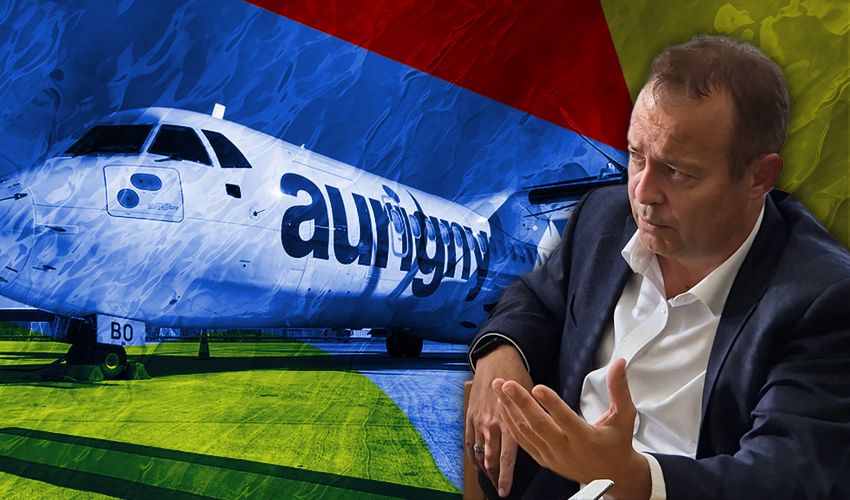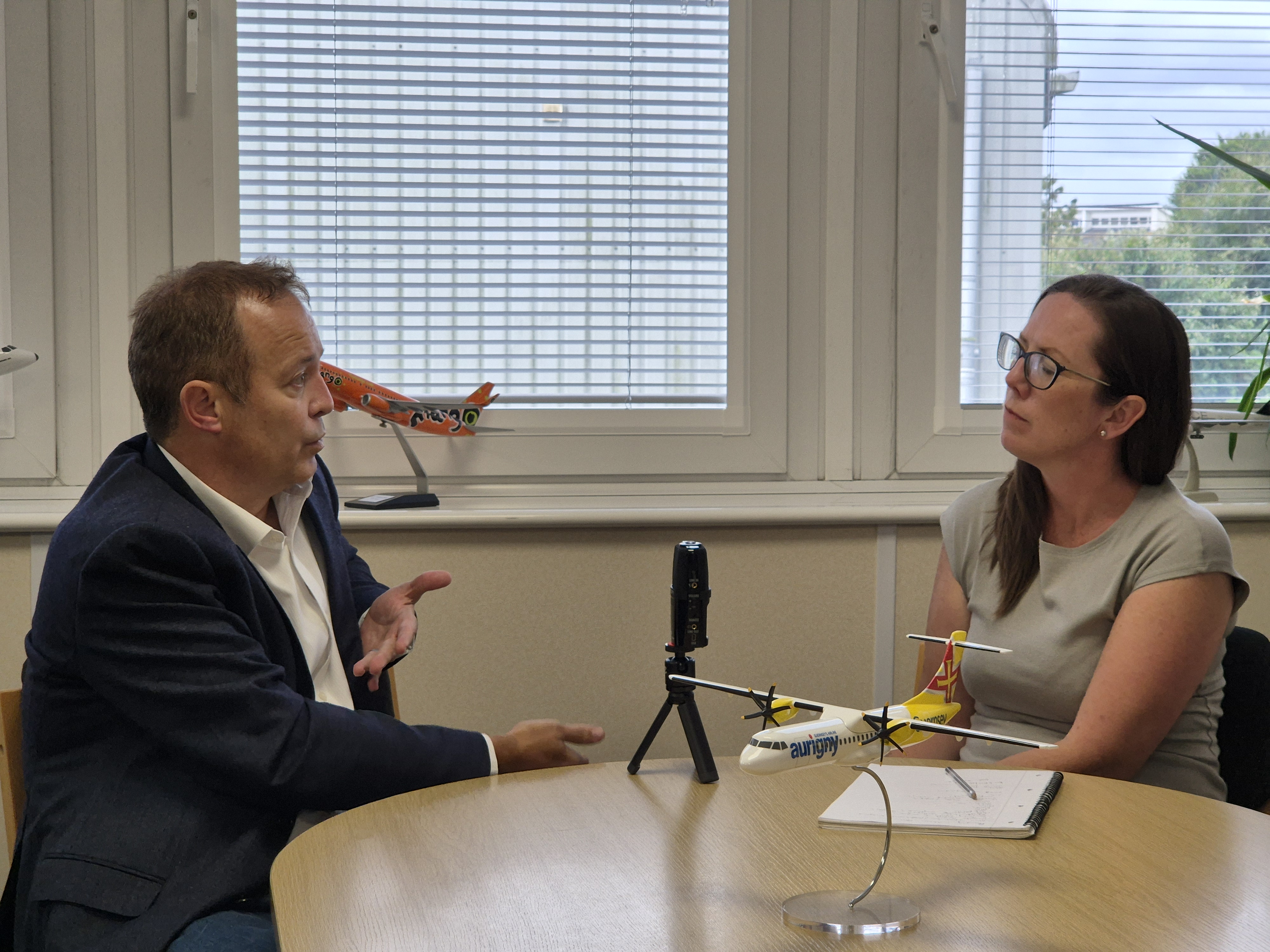


In an exclusive sit down interview with Express, Nico Bezuidenhout has shared his thoughts on how "utterly disappointing" 2024 has been for Aurigny. Admitting the airline has "not delivered" the services required, he has pledged to regain the community's trust.
Speaking at length, Mr Bezuidenhout bared his soul and spoke candidly about the challenges Aurigny has faced this year, what the airline did wrong - and right - and how he intends to improve punctuality and reliability.

Pictured: Nico Bezuidenhout speaking one-on-one with Express Senior Reporter Laura Clayton.
"This has been an utterly disappointing year from a reliability standpoint. There is no doubt that we have not delivered to our normal standards," he said.
"When you look back at 2018 for example, Aurigny's average punctuality rate was 5% higher than the average of all UK carriers, or carriers operating to and from and of in the UK. In the last three years, between 2020 and '23 we ended up growing that to, on average, about 8% above the UK average. So we're typically known for our punctuality and reliability. Last year, we were 5% ahead of British Airways, for example, in punctuality better than Easyjet and the like.
"This year has been particularly challenging, and in this context, from a reliability standpoint, it has now been rectified and I think we're over the worst, but it has been disappointing."
Mr Bezuidenhout explained in detail how the well-documented challenges Aurigny has faced this year included numerous technical problems affecting the Embraer Jet, its ATRs, and its Dorniers, coupled with weather related issues - particularly during February and August, where Guernsey experienced record levels of fog.
He said other challenges that Aurigny has faced - which have not received the same level of scrutiny previously - are affecting other local businesses, and the aviation sector worldwide.
Pictured: Aurigny holds millions of pounds worth of spare parts - but when something big goes wrong, like damage to the landing gear on an ATR earlier this year, the airline has to order it in from elsewhere and there is a worldwide shortage of some of those parts.
"I think that we face some of the same challenges as any other business on the island, in the sense of the cost of living for our employee base, skills shortages in some respects as our business is highly specialised in terms of engineering, pilots and the like. So attracting, recruiting, and retaining the skills needed to run a specialised business like an airline is particularly challenging on an island."
When it comes to the specialised work Aurigny's engineers carry out, Mr Bezuidenhout said the small airline is competing with much bigger carriers to buy in spare parts which are increasingly hard to come by, and at increasingly higher prices
"If you look at, for example, ATR as one of the aircraft types, the number of spare parts that's tracked on the critically short list, has more than doubled in the last two years. And that's true for ATR, that's true for Embraer, that's true for Boeing's, and that adversely affects all carriers, not just Aurigny."
These issues are all managed behind the scenes and have likely occurred to some extent in the past without the level of flight disruptions experienced this year.
Mr Bezuidenhout admits that this year the communication with customers has fallen short of Aurigny's standards along with the decline in punctuality and reliability.
"Sometimes we fail, often we fail..." he acknowledged.
"Sometimes we fail to communicate accurately, or sometimes, of late, we're potentially over communicating. We came in for some flack in the last couple of days for communicating a five minute delay on flight changes. It's difficult to find out where exactly the line is. I think that in the coming months, we'd probably err on over communicating rather than under communicating.
"But some of the criticism has been valid and legitimate, and we fully accept that our punctuality rate this year simply isn't acceptable."
Pictured: Aurigny's engineers monitor flights and use various methods to analyse detailed data, offering an early insight into any technical problems which may affect the aircraft.
In explaining how Aurigny is aiming to communicate those delays and cancellations with its customers in a more timely fashion, Mr Bezuidenhout pointed to the airline's website which can often offer some answers.
"We've done a lot of development this year to, for example, give passengers dynamic and live access to flight disruption data, so you can see yourself directly into our systems when a flight is going to be delayed and how that flight might might move going forward.
"In some cases, we score own goals where it's just erroneous on our part, and we could have communicated better.
"In other cases, you don't necessarily always have the complete information. If I, for example, know that tomorrow I'm going to have an aircraft out of place that's going to affect some passengers, I can't necessarily communicate to the passenger what the plan is for tomorrow, because I have to wait for tomorrow to happen before I can get approval from say Gatwick Airport so that I can operate on an alternative slot. Sometimes it's a question that I'm not allowed to ask until the day of operation, which then leaves you a very short period of time to communicate.
"On top of that is the fact that there's no nice way of communicating a delay or cancellation. People are always going to be disappointed, aren't they?"
Punctuality and reliability rates have been steadily improving since the 'black swan' events of earlier this year which caused extreme delays and cancellations for many of Aurigny's passengers.
However, Mr Bezuidenhout knows that simply telling passengers that matters have improved doesn't immediately equate to improved trust.
"In the end, the trust was broken one flight at a time, and it will be earned one flight at a time as well," he said.
Pictured above and top: All videos and photographs by Luke Webb.
In our exclusive series of articles this week, Nico Bezuidenhout will clarify what went wrong and why technical challenges caused so many problems for Aurigny's schedules earlier this year.
He'll also explain why making a profit is only third on Aurigny's list of priorities, and how Government ownership works here and elsewhere in the aviation sector.
With Aurigny compiling its future schedules - hear firsthand how Mr Bezuidenhout and his staff decide where the airline will fly and how often, and he also explains how he decides which flights to cancel when problems arise.
He's also pledged to "over-communicate" rather than "under-communicate" with customers in the future.
A podcast of the full interview will be published on Friday, including Mr Bezuidenhout's thoughts on Aurigny's staff, customers, and more.
Comments
Comments on this story express the views of the commentator only, not Bailiwick Publishing. We are unable to guarantee the accuracy of any of those comments.